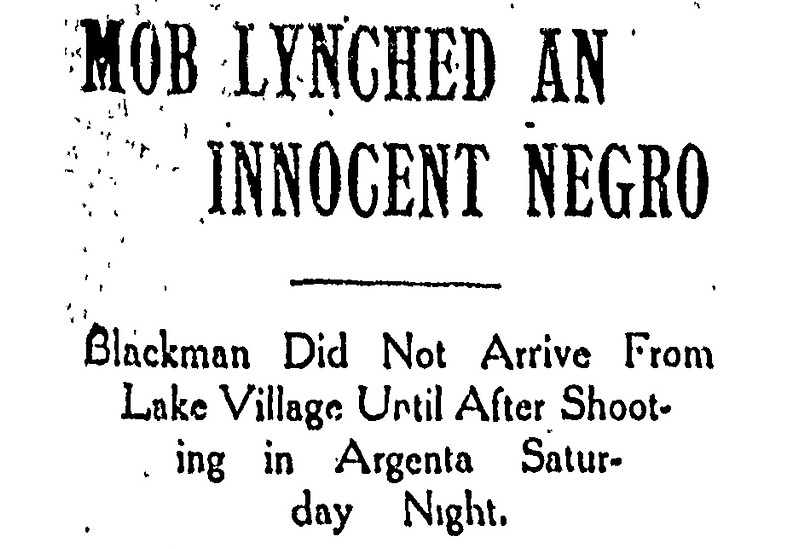A free-standing historical marker will be installed at an intersection in downtown North Little Rock to honor a Black man who was lynched at the site in 1906, according to the Arkansas Peace & Justice Memorial Movement.
Homer G. Blackwell, who was locally known as Blackman, was a successful entrepreneur, restaurateur and leader in the Black community who was lynched on the evening of Oct. 7, 1906, at the intersection of Sixth and Main Streets, according to a news release from the Peace & Justice Memorial Movement, which seeks to commemorate the victims of lynchings in Arkansas.
A marker installation ceremony will begin at 10 a.m. on Oct. 7, on Sixth Street between Main and Maple Streets in North Little Rock, according to the news release.
"One hundred and seventeen years after this racialized terror lynching of a clearly innocent Black man by a multitude of persons unknown, we will install a historical marker at the same intersection where this still unsolved crime occurred to memorialize Blackwell's life and his humanity," said Kwami Abdul-Bey, one of the co-founders and co-conveners of the Arkansas Peace & Justice Memorial Movement. "His story may not be one that we can read about in our history books, but it will now be one that we can learn from by reading this prominently placed marker."
The marker will be installed on private property, so city approval wasn't required.
Blackman had been accused of shooting at John B. Lindsey, a farmer, and his son, Milton Lindsey, on Oct. 6. The elder Lindsey died in the shooting.
Initially, three other men were charged with Lindsey's murder, but all three escaped before a posse could apprehend them, according to an Encyclopedia of Arkansas entry on the Argenta Race Riot of 1906.
Several buildings were burned that night, and the next day, Blackman was arrested "for allegedly firing at the Lindseys," according to the encyclopedia entry.
"That evening, four masked men seized Blackman from the Argenta city jail and marched him, as others watched, to the corner at Sixth and Main streets, where they hanged him from a utility pole and shot him multiple times," according to the Encyclopedia of Arkansas. "A coroner's jury concluded that Blackman died 'at the hands of parties unknown,' the Democrat reported the next day."
The Arkansas Gazette maintained that Blackwell was innocent because he wasn't in Argenta, as North Little Rock was then known, when the shooting occurred, according to the Encyclopedia of Arkansas.
"However, according to the [Arkansas] Democrat on October 9, 1906, a witness reported seeing Blackman run from his restaurant two doors down ... with a pistol in hand immediately after shots were fired at the Lindseys," according to the encyclopedia entry.
According to the marker to be installed on Oct. 7 , two Black men had been shot and killed by white men in September 1906 and nobody was held accountable.
Then, the murder of John B. Lindsey "sparked what would be known as the Argenta Race Riot, wherein white mobs terrorized the Black community, burning Black homes and businesses," according to the historic marker. "Law enforcement failed to stop the violence, and at least 500 Black people fled the city."
Arkansas became the focus of national media attention in August when the state removed Advanced Placement African American studies from its course code catalog, citing in part an executive order and a new state law banning "indoctrination" and critical race theory in schools.
"We are not deterred by the current political climate of book bannings and course revocations to hide both state and national history of racialized terrorism against others by the dominant white culture," said Clarice Abdul-Bey, co-founder of the Arkansas Peace & Justice Memorial Movement.
Kwami Abdul-Bey said the Blackwell marker will be the third historical marker in Arkansas -- the second in Pulaski County -- erected since 2020 to memorialize the lives of the 493 known lynching victims in the state. That number is from the Equal Justice Initiative, which ranked Arkansas third nationally in lynchings per capita.
"We are already making plans for the fourth marker to be erected in Malvern in 2024, as well as supporting the upcoming 100th year commemoration of the Catcher Race Riot and Expulsion of 1923 in the Fort Smith area," said Kwami Abdul-Bey.
At the Blackwell marker ceremony on Oct. 7, North Little Rock Mayor Terry Hartwick will present a proclamation in honor of Blackwell, according to the news release.
Speakers scheduled for the event include North Little Rock School District Superintendent Gregory J. Pilewski; Rachel Patton, executive director of Preserve Arkansas; Elise Hampton, a member of the Black History Commission of Arkansas; state Rep. Jamie Scott, D-North Little Rock; Jerome Green, president of Shorter College; Marie Hollowell first vice president of the Arkansas State Conference of the NAACP; Benito Lubazibwa, ReMix Ideas founder; and two Pulaski County high school students who support the teaching of Arkansas Black history, according to the news release.
Musician Joshua Asante and the Writeous Poets will perform at the event. And the Peace & Justice Memorial Movement will formally launch an essay contest where any public high school student in Pulaski County can earn up to $5,000 in unrestricted post-secondary educational scholarships. A signature drive will also officially begin to get Sixth Street renamed Homer G. Blackwell Avenue, according to the news release.
Admission to the Oct. 7 event is free, but seating is limited to only one hundred participants, so people are encouraged to register to attend at: https://www.eventbrite.com/e/memorializing-the-life-humanity-of-homer-g-blackwell-blackman-tickets-727739567637.
The marker installation event will be broadcast live on the Peace & Justice Memorial Movement's Youtube channel at www.youtube.com/@APJMM2019 and its Facebook page at www.facebook.com/APJMM2019.
